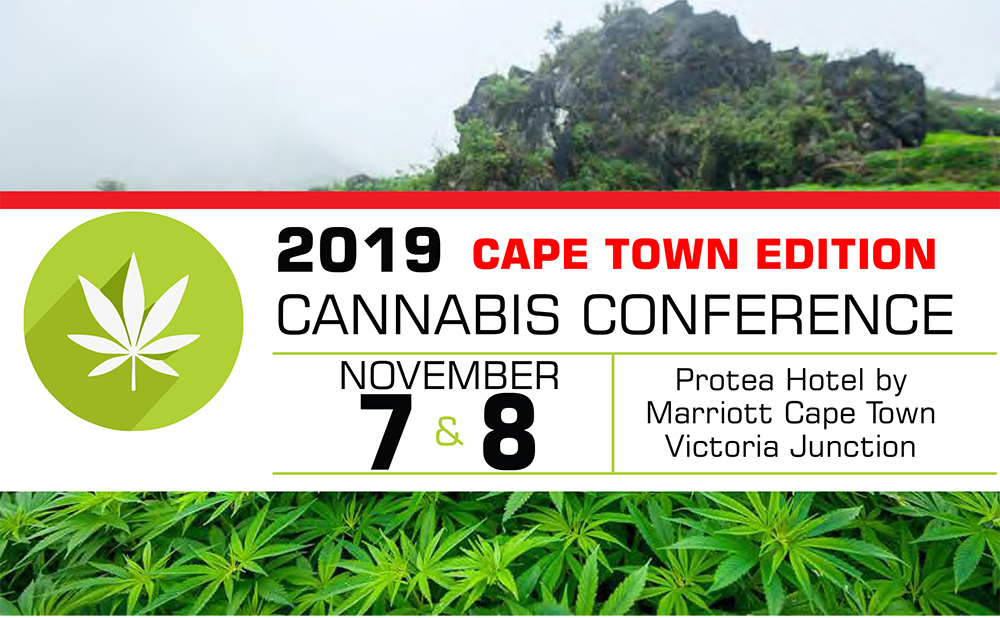
Jul
Cannabis Conference Cape Town
After overwhelming response at the just ended Cannabis Conference 2019 -Johannesburg edition, we are back again this time in Cape Town, to continue the debates that emanated at the 27 & 28 June 2019 Conference in Johannesburg.
This Cape Town Cannabis Conference edition takes a further step into the cannabis discussions aiming at creating awareness on various issues within the Cannabis industry. This is a must attend for all cannabis suppliers and those involved in manufacturing, extraction, marketing and distribution.
For decades, the growth and use of cannabis (also known as marijuana, weed, pot, dagga) for either recreational and/or medicinal purposes remained prohibited in almost every part of the world. Despite its illegality, marijuana use has been fairly common as it remained one of the most popular illegal drugs used in the world. Only most recently have some countries (Canada, Switzerland, Peru, Portugal, Italy etc.) decriminalised cannabis use, with others restricting its use for medicinal purposes only (Netherlands, New Zealand, Poland, Greece etc.). Most African countries have remained adamant to decriminalise the use of cannabis, except for Lesotho and Zimbabwe which recently legalised growth of marijuana for medicinal use. It was only last year on the 18th of September when the South African constitutional court legalised adult use of cannabis in private and growing enough for personal consumption. Many celebrated this long-awaited court’s decision such that a competition titled “Bushmastery” was launched from January to May 2019, offering R1000 cash to anyone who can grow the biggest cannabis plant in the country. One could argue that this may be a strategy to encourage cannabis growers to venture into the burgeoning global cannabis industry. South Africa is amongst the very first few African countries to legalise marijuana use even though its usage is limited to the private sphere. What are the implications of this legalisation of marijuana for the country?
Moreover, just how much growth of cannabis is considered enough for personal consumption? And what are the implications of legalising marijuana for organisations (in the work place)? Since the drug remains in a person’s bloodstream for hours to days or even weeks after use, how can businesses set boundaries for marijuana use in the workplace? Furthermore, it is also interesting to note that global beverage company Coca-Cola has intentions of developing cannabis infused beverages which contain the ingredient cannabidiol, considering the growing market of the industry. What kind of ingredient is cannabidiol and what effects does it carry along? In fact, South African brewery, Poison City Brewing, recently produced a cannabis infused beer, Durban Poison, the first cannabis-based beer to be developed in the country. What does all this imply for the local cannabis industry? This conference offers a platform to discuss and shed light on all these issues.
It is not surprising that certain conservatives in South Africa, mostly in religious and political circles, are not pleased with the court’s decision to legalise marijuana, arguing that there is “objective proof of the harmful effects of cannabis” (The Telegraph, UK). It can be argued that nothing has without effects! In fact, studies have shown that legalisation of cannabis poses certain public health risks. Although the health benefits of cannabis have been widely celebrated, one should not overlook the pitfalls of marijuana legalisation. This ongoing debate on the decriminalisation of cannabis use is a pressing issue that needs attention. Hence, these issues are amongst the objectives of this conference, in order to gain more insight on the various effects of cannabis, both negative and positive, to discuss ways in which the plant can be utilised in doing more good than harm, and to explore the importance of growing the plant not only to the individual citizen, but also to the country as a whole, which could open up the eyes of those conservatives who seem to be against the legalisation of cannabis use. The Cape Town edition takes a further step in the cannabis discussions. This is a must attend for all cannabis suppliers, manufacturing, extraction, marketing, farmers and distributors.


May
International No-Dig South Africa 2018
ISTT’s 36th Annual International No-Dig Conference and Exhibition will be hosted by the Southern African Society for Trenchless Technology (SASTT) and is to be held on the 8-9 October 2018 at the Cape Town International Convention Centre (CTICC), South Africa.
Hosted by the South African Society for Trenchless Technology (SASTT), the exhibition is a unique opportunity for suppliers to showcase products and services at the only event in the African continent to focus on trenchless technology.
Conference
INTERNATIONAL NO-DIG SOUTH AFRICA 2018 will include a comprehensive Conference programme, assembled by a technical committee comprising representatives of SASTT and ISTT.
The International Society for Trenchless Technology (ISTT) has a reputation of presenting top quality international Conference programmes, featuring speakers from around world. Included will be papers on the latest innovations and techniques, as well as case study presentations with a regional focus.
CALL FOR PAPERS: https://www.cfp2018.nodigsouthafrica.com/
REGISTRATION: https://www.westrade.co.uk/cgi-bin/start.cgi/files/NDSA18/initialise.html?workdetail=index.html

Aug
Cashless Payments Summit
Cashless national economies are becoming a phenomenon the world over. In India, the government has recently demonetised the country’s two highest cash denominations, and – as discussed at last year’s conference – cash in Scandinavia has been virtually driven out of existence. Now, it seems the rest of the world has warmed up to cashless currencies and wants to catch up.
In Africa over the last decade, innovation in the financial services sector has seen the novelties of internet banking and multi-currency cards rise among other innovations. The lightning pace of disruptive technologies in this information age has meant that most people in the emerging economies – South Africa included – skipped right past the computer and straight into mobile technology. According to a report by research organisation, Research and Market, the South African mobile payment market is expected to record a 33.2 percent growth between this year and 2021 to reach US$18,362 billion in transaction value.
With almost half of Africa’s population having access to mobile phones in 2016, the leaning towards smart phones has increased the technological variations available to financial service providers; and the proliferation of these apps has been one of the greatest drivers towards cashless societies. The 2016 edition of the Cashless Payments Summit also proved the mobile phone to be a boon for most of the unbanked populations in Africa – particularly in Kenya and Zimbabwe, where mobile money platforms, MPesa and Ecocash respectively, have taken root.
Consulting firm Frost and Sullivan says mobile money and the other facets of the cashless economy – smart cards, electronic payment systems, internet and mobile banking; among others will be approaching $2billion as a business in Sub-Saharan Africa. This is a modest amount compared to world standards; but infrastructural developments could see things moving rapidly; already, the first world has seen smart watches and wrist bands that can transact – their arrival on the shores on emerging markets can disrupt the cashless game and launch it straight into the future.
But taking advantage of these developments depends on the readiness of our infrastructure and regulatory framework. Besides the traditional financial services providers, South Africa has seen the rise of financial technology start-ups whose innovations have disrupted the way people handle transactions. But while these have worked wonders in urban areas where infrastructure is more advanced, questions are still being asked about how to include rural populations and citizens who do not have bank accounts. Uptake on the digital platform has been slow. But that is where the good news come in; the slow penetration of digital infrastructure in place at this time opens the door for fintech businesses to provide financial services to millions of consumers who previously haven’t had access to bank accounts themselves, digital payments or other financial options.
The options for financial technology businesses are significant; because such people have never built out the traditional or card payment infrastructure, there is a significant opportunity for fintech companies to step in and create a completely new cashless ecosystem that leverages infrastructure such as mobile phones as a payment device.
At this year’s conference, which is scheduled for the 19th and 20th of October 2017 at the Radisson Blu Waterfront in Cape Town, discussions will go deeper into how cashless means of transacting can be spread across the country and continent, and how monetary institutions could grab the cashless technology to prop up Small and Medium Enterprises (SMEs) through such lending models as invoice, discount financing and digital lending. The summit will also discuss the availability of infrastructure necessary for the foundation of a cashless society, and the spread of such.
Objectives
• To map out South Africa’s rate of progress towards cashless societies
• To explore the possibility of smart cities and their impact on financial inclusion
• To discuss the impact of disruptive technologies on financial services
• To identify risks of cashless transactions and ways to overcome them
• To learn more about blockchain cryptocurrency technologies
• Explore ways of bring unbanked populations into the formal economy through cashless innovations
Who should attend?
• Chief Financial Officers
• Point of Sale manufacturers
• Chief Technology Officers
• Mobile Banking executives
• Heads of Payment
• Retail managers
• Small and Medium Businesses
• Bank managers
• Mobile network managers
• Telecommunications managers
• ICT managers
• Security managers
• Cyber-security experts
• Risk Officers
• Business development executives
• Software development engineers
• Digital banking executives
• Card manufacturers and suppliers
• Digital money start-ups
• Account Managers
• Blockchain Specialists
• Cryptocurrency experts
• Financial Services Regulators
Target sectors
• Fintech
• Financial Services
• Wholesale
• Retail
• Consumer groups
• Information and Communication technology
• Mobile phone businesses
• Government departments
• Municipalities
• Banks and financial institutions
• Fintech Startups

May
Blue Economy Conference
About the Event
More than 90 percent of Africa’s imports and exports are conducted by sea and some of the most strategic gateways for international trade are in Africa. This inherently underscores the geopolitical importance of the region. The development of the Blue Economy holds immense promise for South Africa.
South Africa is blessed with a 3 924-km coastline; and uniquely bordered by two oceans on three sides – east, South and West.
Today more than ever the oceans are big business and have become a growth point for a variety of industries including fishing, marine transport, tourism and even electricity
The Blue Economy is envisaged as the integration of the Ocean economy development with a major focus on “social inclusion, environmental sustainability and innovative dynamic business models”. The Oceans covering South Africa are a prime area for seaway trade and commerce as it has a variety of untapped natural resources. The Oceans Economy will focus on Fisheries and Aquaculture, Renewable Ocean Energy, Seaports and Shipping, Seabed Exploration and Minerals, Marine Biotechnology, Research and Development, Tourism, Ocean Knowledge Clusters, SIDS and LDC.
The Blue Economy Symposium seeks to understand better the enormous opportunities emerging from investing and reinvesting in Africa’s aquatic and marine spaces, the balance can be tipped away from illegal harvesting, degradation, and depletion to a sustainable Blue development paradigm, serving Africa today and tomorrow. If fully exploited and well-managed, Africa’s Blue Economy has massive potential to constitute a major source of wealth and catapult South Africa and the continent’s fortunes as a whole.

Objectives
- Deliberate on finding sustainable means to utilize ocean and other water resources to develop a healthy blue economy for the country.
- Meet and Learn from experienced experts
- Learn about the Blue Economy concept and how it benefits the South African economy
- Deliberate on Frameworks and policy reform to attract more sustainable investments in the ocean
- Explore the Investment opportunities in the public and private sectors and Public and Private Partnerships
Aspects to be Covered
- Realizing the ocean’s potential
- Integrated understanding of Blue Economy
- Life Cycle Analysis, Environmental Impact Assessment and other decision-support tools
- the actual opportunities of the marine economy and how businesses and entrepreneurs can access them
- Managing coastal environments
- How to finance a sustainable ocean economy
- How coastal and marine tourism can help blue economies thrive
- How to fund blue economy endeavors and where to find partners
- What are the skills and competencies need to achieve an effective blue economy structure in South Africa
- How best to use the sea in an economically and environmentally friendly structure
- Emerging blue industries and solutions to overcome the problem of overfishing and pollution
- Emerging ocean industries and the vibrant ocean economy
- The role of marine protected areas (MPAs) and sustainable aquaculture
- Mapping the industrialization of our ocean, the risks and opportunities
- Industry best practices
- Sustainability and profit maximization
- Scaling the response to pollution and plastics
- Understanding the importance of the blue economy
- Employment creation
- Promoting entrepreneurship
- Effectively utilizing vast, untapped opportunities presented by the ocean
- Exploring the notion “Investing in Blue Growth depends on good governance and investment”
- What are the resources available for the blue economy at national and regional scale?
- Case Studies of successful investments in smart and sustainable solutions.
- Private sector can drive scalable, sustainable investment in the ocean
- challenges across the different blue economy sectors
- Looking into the future
- Blue Economy as a South African Strategic Priority
- Towards an integrated understanding of blue economy
- Diversifying economies beyond land-based activities and along coasts all in a climate-intelligent way
- How large is the opportunity?
- What are the risks involved?
- What is sustainable investment in the ocean?
- What kind of investment frameworks might be necessary?
- What capital is available, and how can it be scaled up?
- How do large corporate and financial institutions evaluate the sustainability of their investments in the ocean? What mechanisms are currently available?
- What is the scale of opportunity in the ocean economy?
- Discover what technologies are becoming increasingly relevant
WHO SHOULD ATTEND?
- Oceanographers
- Fishery scientists
- Environmentalists
- Naval experts
- Maritime industrialists
- Investment banking
- Construction and infrastructure developers
- Energy, renewable energy and deep sea mining
- Fishing and aquaculture
- FMCG and manufacturing
- Healthcare, medical research
- and regulation
- environmental and risk consulting
- Marine insurance and re-insurance
- NGOs, foundations and conservation funds
- Hospitality and Tourism
- Transportation, freight, port and airport authorities
- Telecommunication
- technology and ocean innovators
- Waste management and water treatment
